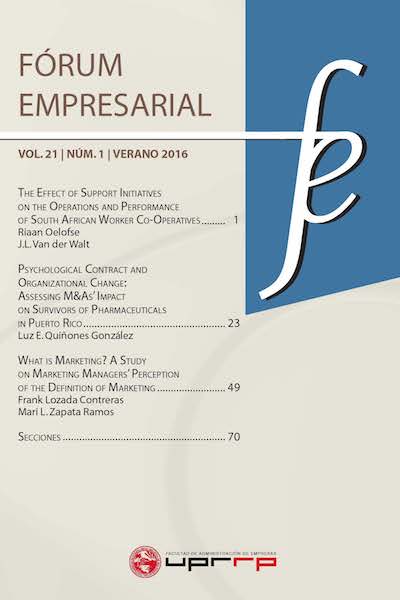Abstract
This study of 111 worker co-operatives registered as clients with the Small Enterprise Development Agency represents a research into the contribution of government support to the business performance and operations of these entities. A relatively successful group was evaluated against unsuccessful ones to establish whether there was any difference in the support received by the groups concerned. Moreover, the performance, operations, and management of supported co-operatives were evaluated against unsupported ones to establish whether the support had made a difference. The results reveal a minimal effect on the co-operatives‘ operations and performance. Recommendations for future development are made.References
Brazda, J., & Schediwy, R. (2001). Preconditions for successful cooperative ventures in the light of historical evidence. Review of International Co-operation, 94(1), 35-42.
Chakela, T. (2012). The performance of cooperatives in Mantsopa municipal area (Unpublished master‘s thesis). University of the Free State, Bloemfontein, South Africa.
Companies and Intellectual Property Commission. (2013). Statistics of co-operatives in the Republic of South Africa: 2009 to 2012, Vol¬ume 4. Retrieved from http://www.cipc.co.za/index.php/manage-your-business/manage-your-cooper/changing-status-your-company/division-co-operative/
Chamard, J., & Webb, T. (2006). Editors notes. In J. Chamard & T. Webb (Eds.), [Accounting for cooperatives] (pp. 3-15). Symposium conducted at Saint Mary‘s University, Halifax, Canada.
Chibanda, M., Ortmann, G. F., & Lyne, M. C. (2009). Institutional and governance factors influencing the performance of selected smallholder agricultural cooperatives in KwaZulu-Natal. Agrekon, 48(3), 293-306.
Cohen, J. (1988). Statistical power analysis for the behavioural sciences (2nd ed.). Hillsdale, NJ: Erlbaum.
Cornforth, C., Thomas, H., Lewis, J., & Spear, R. (1988). Developing successful worker co-operatives. London, England: Sage Publications.
Dash, A. (2013). Building smart cooperatives for the 21st century. In B. Roelants (Ed.), Cooperative growth in the 21st century (pp. 41-47). Brussels, Belgium: International Cooperative Alliance.
Department of Trade and Industry. (2004). A cooperative development policy for South Africa. Retrieved from http://www.dedea.gov.za/Economic%20Development%20Legislation/Cooperatives%20Development%20Policy%20of%20SA%202004.pdf
Department of Trade and Industry. (2010). Briefing on the development and support programmes for co-operatives: Empowerment and Enterprise Development Division (EEDD). Retrieved from http://pmg-assets.s3-website-eu-west-1.amazonaws.com/docs/100825dti-edit.pdf
Develtere, P., Pollet, I., & Wanyama, F. (Eds.). (2008). Cooperating out of poverty: The renaissance of the African co-operative movement. Retrieved from http://labordoc.ilo.org/record/412725
Dvir, D., Sadeh, A., & Malach-Pines, A. (2010). The fit between entrepreneurs‘ personalities and the profile of the ventures they manage and business success: An exploratory study. Journal of High Technology Management Research, 21, 43-51.
Fairbairn, B. (2002). How "social" are coops? Tensions, transitions, and the social economy of co-operatives in Canada. Économie et Solidarités, 33(1), 112-130.
Haber, S., & Reichel, A. (2007). The cumulative nature of the entrepreneurial process: The contribution of human capital, planning and environment resources to small venture performance. Journal of Business Venturing, 22, 119-145.
Harms, B. (2012). The role of co-operatives in enterprise and SMME development (local economic development). Retrieved from http://www.dgrvsa.co.za/Publications/SMMETshwane.pdf.
Hough, P., Wilson, D., & Corcoran, H. (2010). The worker co-op sector in Canada: Success factors, and planning for growth. Retrieved from http://www.canadianworker.coop/sites/canadianworker.coop/files/CWCF_Canadian_SSHRC_Pa¬per_16-6-2010_fnl.pdf.
International Co-operative Alliance. (2010). Co-operative identity, values and principles. Retrieved from http://ica.coop/en/what-co-op/co-operative-identity-values-principles.
International Co-operative Alliance. (2012). Statistical information on the co-operative movement. Retrieved from http://www.ica.coop/ coop/statistics.html.
Machaba, M. (2012). Statistical report: South African National Apex Co-operative (SANACO). Pretoria, South Africa.
Mqingwana, C. B. (2010). The role of co-operatives in the socio-economic development of Dutywa villages, Port Elizabeth (Unpublished master‘s thesis). Nelson Mandela Metropolitan University, Port Elizabeth, South Africa.
Philip, K. (2003). Co-operatives in South Africa: Their role in job creation and poverty reduction. Retrieved from http://www.dgrvsa.co.za/Publications/safoundation.pdf
Redrebel Productions. (Ed). (2009). The DTI baseline study of co-operatives in South Africa. Pretoria, South Africa: Department of Trade and Industry.
Ressel, A. (2014). Let‘s stop throwing stones in the well. Retrieved from http://www.bizcommunity.com/Article/196/626/118427.html#more
Satgar, V. (2007). The state of the South African cooperative sector. Retrieved from http://www.copac.org.za/files/State%20of%20Coop%20Sector.pdf
Satgar, V., & Williams, M. (2011). The worker co-operative alternative in South Africa. In J. Daniel, P. Naidoo, D. Pillay, & R. Southall (Eds.), New South African Review 2 (pp. 202-220). Johannesburg, South Africa: Wits University Press.
Simpson, M., Tuck, N., & Bellamy, S. (2004). Small business success factors: The role of education and training. Education + Training, 46(8), 481-491.
Skibbens, R., & Chamard, J. (2006). If you don‘t measure it, you can‘t manage it! In J. Chamard & T. Webb (Eds.), [Accounting for co-operatives] (pp. 36-45). Symposium conducted at Saint Mary‘s University, Halifax, Canada.
Statistics South Africa. (2012). Statistical release P0441: Gross domestic product: Second quarter 2011. Retrieved from http://www.statssa.gov. za/publications/P0441/P04412ndQuarter2011.pdf
Steyn, H. S. (2009). Manual for the determination of effect size indices and practical significance (2nd ed.). Retrieved from http://v-drpl-lnx2.nwu.ac.za/content/nwu-potchefstroom-campus-faculty-natural-sciences-statistical-consultation-service-10
Theron, J. (2008). The co-operative tradition in South Africa and Namibia: Essential research for a co-operative facility. In P. Develtere, I. Pollet, & F. Wanyama (Eds.), Cooperating out of poverty: The renaissance of the African co-operative movement. Retrieved from http://labordoc.ilo.org/record/412725
Timmons, J. A. (1999). New venture creation: Entrepreneurship for the 21st century (5th ed.). Boston, MA: Irwin/McGraw-Hill.
Wessels, J. (2014). Presentation on the 1st report on co-operatives in the Free State province (Unpublished manuscript). University of the Free State, [Bloemfontein,] South Africa.
By submitting a contribution to consideration of the Editorial Board of Fórum Empresarial, the authors attest that it is an original, unpublished work, which has not been nor will be simultaneously submitted to another journal for consideration and publication; that they are responsible for the work carried out and the content of the article; and they have the corresponding copyrights.
The authors grant the right of first publication of their work to Fórum Empresarial, in any medium and physical and electronic format, including internet. Publication shall be subject to the Creative Commons Attribution-NonCommercial 4.0 International License, which allows third parties to share the work, provided that the author and Fórum Empresarial (as a first publication) are cited.
The journal allows authors to retain publishing rights without restrictions. Authors are able to enter into separate, additional arrangements for the non-exclusive distribution of the journal's published version of the work (e.g., post it to an institutional repository or publish it in a book), with an acknowledgment of its initial publication in Fórum Empresarial.

